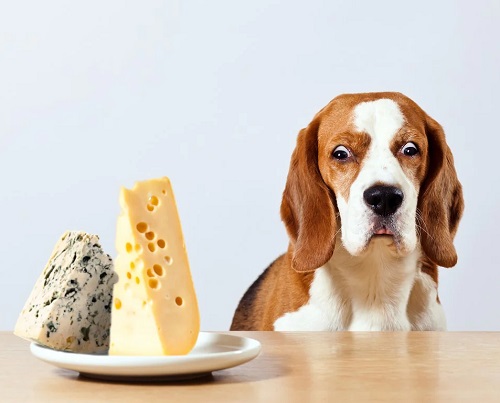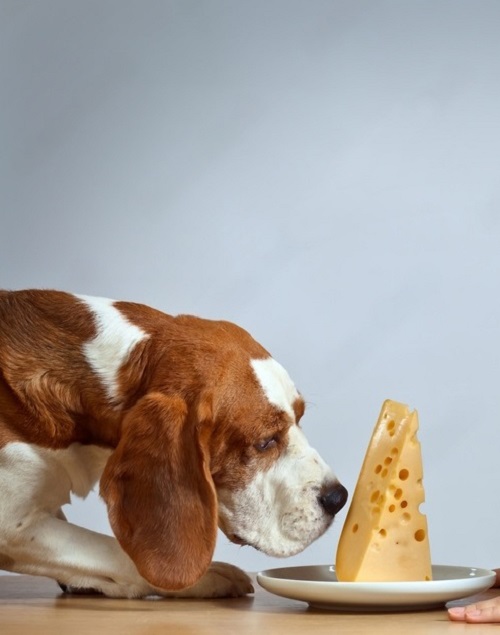Can Dogs Eat Cheese? Discover the cheesy truth about whether your furry friend can indulge in this dairy delight!
Can Dogs Eat Cheese? Are they a good alternative to other sources of proteins for the pooch? Read on to find out the truth!
What is Cheese?
Cheese is a dairy product made from milk, usually from cows, goats, or sheep. It is produced by coagulating the milk proteins with rennet or an acidic substance, such as lemon juice or vinegar, and then separating the solid curds from the liquid whey.
Cheese can be produced in many different varieties and flavors, depending on factors such as the type of milk used, the method of production, and the aging process.
Check out Can Dogs Eat Cottage Cheese here
Can Dogs Eat Cheese?
Yes, dogs can eat cheese, but it should be given to them in moderation. Cheese is high in fat and calories, so overfeeding it to your dog can lead to obesity and other health problems.
Also, some dogs may be lactose intolerant, which means they cannot digest the lactose found in dairy products like cheese.
Health Benefits of Cheese for Dogs

Here are also some potential health benefits to be aware of:
- Cheese can be a good source of protein and calcium for dogs.
- Protein helps to build and repair muscle tissue, while calcium is important for maintaining strong bones and teeth.
- Cheese also contains vitamin A, which supports healthy vision and immune function.
- Cheese can be used as a tasty training treat for dogs.
Check out Can Dogs Eat Feta Cheese here
A few Health Concerns of Cheese
- Cheese is high in fat and calories, so overfeeding it to your dog can lead to obesity and other health problems.
- Some dogs may be lactose intolerant and have difficulty digesting dairy products like cheese. This can lead to digestive upset, such as diarrhea, vomiting, and gas.
- Cheese can be high in sodium, which can contribute to high blood pressure and other health issues in dogs.
- Certain types of cheese, such as blue cheese and Roquefort, contain mold, which can be toxic to dogs in large amounts.
- Cheese can also be a choking hazard for dogs, especially if it is given in large chunks or pieces.
- To ensure your dog’s safety, it’s important to monitor their cheese intake and choose low-fat options whenever possible.
Types of Cheese Safe for Dogs
Not all types of cheese are safe for dogs, but there are several varieties that are generally considered safe in moderation. These include:
- Cheddar cheese
- Mozzarella cheese
- Cottage cheese
- Cream cheese
- Swiss cheese
- Provolone cheese
When giving your dog cheese, it’s important to choose low-fat options whenever possible and to monitor their reaction. Start with a small amount and watch for any signs of a digestive upset or allergic reaction, such as vomiting, diarrhea, or itching.
Check out Can Dogs Eat Parmesan Cheese here
Types of Cheese Unsafe For Dogs
Some types of cheese are unsafe for dogs and should be avoided. These include:
- Blue cheese and Roquefort: These cheeses contain mold that can be toxic to dogs, particularly in large amounts.
- Feta cheese: It is high in sodium and fat, which can be harmful to dogs in excess.
- Processed cheese: Processed cheese products, such as cheese slices or cheese spreads, often contain additives and preservatives that can be harmful to dogs.
- Spicy or flavored cheese: They may contain ingredients like onions, garlic, or peppers that can be toxic to dogs.
Check out Can Dogs Eat Cheesecake here
How to Feed Cheese to Dogs
If you want to feed safe cheese to your dog, here are a few tips to keep in mind:
- Choose a low-fat and low-sodium cheese option, such as cheddar or mozzarella.
- Cut the cheese into small pieces or shreds to make it easier for your dog to chew and digest.
- Only give your dog a small amount of cheese as a treat or as a topper for their regular food.
- Monitor your dog’s reaction to the cheese and watch for any signs of a digestive upset or allergic reaction, such as vomiting, diarrhea, or itching.
- If your dog has never had cheese before, introduce it gradually and in small amounts to avoid digestive upset.
- Avoid giving your dog cheese if they are lactose intolerant or have a history of digestive issues or allergies.
Check out Can Dogs Eat Eggs here
In What Amount It Can Be Served To Dogs in a Day?
The amount of cheese that can be safely served to dogs in a day will depend on several factors, including your dog’s size, weight, age, and activity level.
A small dog weighing 10 pounds may only be able to safely consume a small amount of cheese, such as 1-2 small cubes or shreds, while a larger dog weighing 50 pounds may be able to consume a bit more, such as 3-4 small cubes or shreds.
Quick Takeaways
So, can dogs eat cheese? Dogs can eat cheese in moderation as part of a healthy and balanced diet. Cheese can provide some nutritional benefits, such as protein, calcium, and vitamin A, and can also be a tasty training treat for dogs.



